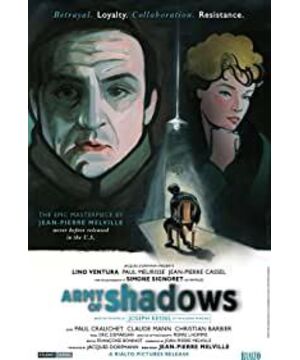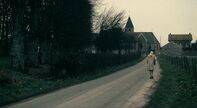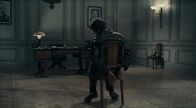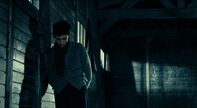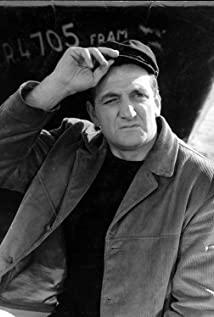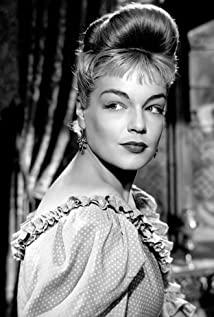The French film scene in the 1960s was full of splendor. The old masters such as Jean Renoir, Robert Bresson, Jacques Dati and others were still brilliant, and their masterpieces came out one after another. A new generation of directors to watch, François Truffaut, Jean-Luc Godard and Claude Chabrol are among them. However, a major event in the French film scene in the 1960s was the tortuous journey of Jean-Pierre Melville from being ignored by the world to being recognized as the "Father of the New Wave".
Melville was born in Paris in 1917, formerly known as Gerhambach, and changed his name to Jean-Pierre Melville because of his admiration of Melville, the author of Moby Dick.
At the end of World War II, French cinema was at a low ebb. Melville started his own film company as an independent producer. This independent production method and the personal style that always runs through the works are exactly the "author theory" method advocated by the group of trendy directors of "Cinébook", especially François Truffaut: independent and consistent work method (screenwriting, directing, editing) and consistent authorship (movie technique, directorial thinking). Melville's works are known for their sharp thinking and unique style, and are known for shaping the special characters in special environments and creating the atmosphere of the film. Many film critics say that Melville's films are more interesting the more they watch, and the more they chew, the more flavorful they are.
Melville, who died of a myocardial infarction on August 2, 1973, did not direct many films in his life, and the most famous ones are those who cooperated with big stars such as Alain Delon, Yves Montan and others. It is a commercial police and bandit film, so its status in the French film industry is far from first-class. But Melville was a fairly wide-ranging director in the early days, especially during World War II, and his involvement in the war served as an inspiration for his early films. His first work, The Quiet Sea, recounts the grudge between a French family and a German officer during the German occupation of France. The second film, "Scary Children", was a successful work co-written with the famous writer Jean Cocteau. Although this film did not cause a sensation at the time, it later became a masterpiece. Since he filmed "Big Gambler Bob" in 1955, he began to create a series of police and gangster films.
"Shadow Army" tells several stories of resistance warriors fighting their enemies during the German occupation of France in 1940.
Melville's film is dark in style and solemn in color. He uses a variety of artistic techniques to vividly and forcefully express the author's reflection on the resistance movement and its era. The characters in Melville's works, unlike the heroes in the romantic works, fought for the collective and national interests, but also succumbed to emotional weakness or personal motives, causing harm to the collective cause. . These intrepid fighters live in secret networks cut off from the wider masses, and risk leaving the organization. There are only a handful of French people who have contact with them. Apart from a peasant family, there is only one baron in the film; the masses help them by chance and have no intention of understanding their actions. The barber played by Chiani, when Gepier killed the French guard to escape from the tiger's mouth and broke into his barber shop, the German motorcycle team flew past the door. Of course, the barber guessed who came. But he didn't say anything other than changing Jebier's coat. All this is in stark contrast to the traditionally advertised resistance movement that is supported by the masses.
Melville does excel at portraying characters. As soon as the protagonist of the film Gepier appeared on the stage, the director used a set of amazing shots to express the hero with both wisdom and courage. When he was escorted to the German city defense command in Paris, as Gepier observed the situation around him, a panoramic shot appeared in front of the audience: in a very spacious hall, the registration desk was near the door, and the far side was a little farther. The wall is completely occupied by the telephone exchange. Except for the sound of a large clock clearly striking every second, there was a dead silence around. This continuous special sound makes people feel that time is both fast and slow. Jebier was taken to a corner where a German soldier with a gun was watching the other arrested man, who was sitting beside him. In this abnormal atmosphere, there is neither dialogue nor action, and the picture seems to freeze. The two men's nervous heartbeats seemed to synchronize with the ticking of the great clock. The director used close-up shots and facial close-ups with side lighting to highlight the faces of the two in front of us. The two arrested persons who had never known each other exchanged their eyes three times, full of confidants, and kept silent. These three silent glances had formed a mature joint escape plan. In order to explain the psychology of the two people, the director used the panning and pulling camera to explain the positions and postures of the three people from multiple angles: first, there is the back of a soldier occupying most of the screen, and the two arrested only occupy a small area in the lower left corner of the screen. part. Their forward-curved figures stand in stark contrast to the statuesque stance of the German guards, and this shot alone is enough to make the audience feel that the situation is grim. Another shot is of the German guards with their guns and the two arrested with their bare hands. The contrast is strong, and the power disparity is self-evident. After the layers of these "silent is better than sound" shots, the still picture is suddenly broken. After Gepier hinted at another arrested person with his eyes, he got up and walked towards the German soldier and asked, "Can you give me a cigarette?" Ye has already drawn the dagger from his body, waved his arm, and stabbed him in the throat at once. Immediately afterwards, various sounds such as rapid running, alarm bells, and gunshots blended together. A long shot follows Gepier's struggle, and the atmosphere eases only slightly when he pushes the door and escapes into a barber shop. But when he had not resumed his normal breathing, the police car whizzed past the door, and the audience's nervous mood was still difficult to relax. The movement of the camera lens and the use of sound left a deep impression on people, and also highlighted the heroic character of Gepier.
The narrative of the film is concise, concise and smooth. After Felix was arrested, in order to show the interrogation room of the German Gestapo and the residence where Gepierre temporarily stayed in London, the director used parallel montages many times. There was no dialogue in these pictures. in the screen. For Felix's interrogation, Melville used only two shots: first, with his hands handcuffed to the back of a chair, his head raised, his eyes glaring, and he said nothing. Later, he was still sitting on the spot, but his clothes were broken, his face was covered in blood, his head was drooping on his chest, his eyes were closed, and he seemed to have passed out. Only these two scenes in the whole interrogation process are enough to make the audience understand everything.
Mathilde was soon met by Jepier after a night parachute flight back to France. Melville very succinctly outlines the image of the heroine as resolute, courageous, courageous and resourceful: in secret meetings with her companions, her calm and determined face, deep and cold eyes constitute the most powerful elements of the picture. . Viewers immediately realize that this is a highly cohesive central figure who is both authoritative and beloved. Immediately followed by a set of juggling montages flashing and splitting shots, Mathilde, in order to rescue her comrade Felix, disguised herself as a graceful and reserved lady wandering in the German officers' club, and then transformed herself into a naive peasant woman walking down a country lane. She was studying the terrain of the military hospital where Felix was imprisoned, and she was drawing maps and planting time bombs. Close-ups and various scenes flash alternately, giving the audience a sense of tension that is almost breathless.
The success of this film is inseparable from the excellent performance of Reno Ventura, the actor of Gepierre. Chinese audiences have spoken highly of Tibelle, the protagonist he played in The Silent Man.
Rino Ventura was born in Parma, Italy on July 14, 1917. When he was eight years old, he moved to Paris with his father to settle down. He has been taciturn since he was a child and only likes to watch movies. He admired and imitated Humphrey Bogart, Jean Gabon, James Jacqueline, Spencer Tracy and Calais Cooper, which was one of the reasons for his later acting skills . His sports experience also helped him a lot in his film career. Reno Ventura was a former athlete who excelled in freestyle wrestling and boxing. In 1950, he won the European middleweight boxing championship, and later bid farewell to the ring with a broken leg. His sports career made him physically strong, sharp-eyed, responsive, good at mastering position and timing, and controlling his limbs and movements, which benefited him a lot in his later performances. In 1953, he played a strong man who can lift a car in Jacques Becker's film "Don't Use This Money". The protagonist of the film is played by Jean Gabon, and this strongman has not yet been played. It was introduced that Ventura and Gabon played together when they first appeared on the screen. They cooperated very well. Gabon admires the talent of his new partner.
For 40 years, Rino Ventura has been intimate with the famous directors Claude Saudet, Jean-Pierre Melville, Claude Le Roouche, Pierre Granier-Defer and others He has collaborated on nearly 100 films. Two of his most successful characters were the general manager in Molinaro's "The Seducer" and the other in Van Hera's 1984's "One Hundred Days of Parma" A police officer who fought against the Mafia is unforgettable.
View more about Army of Shadows reviews


